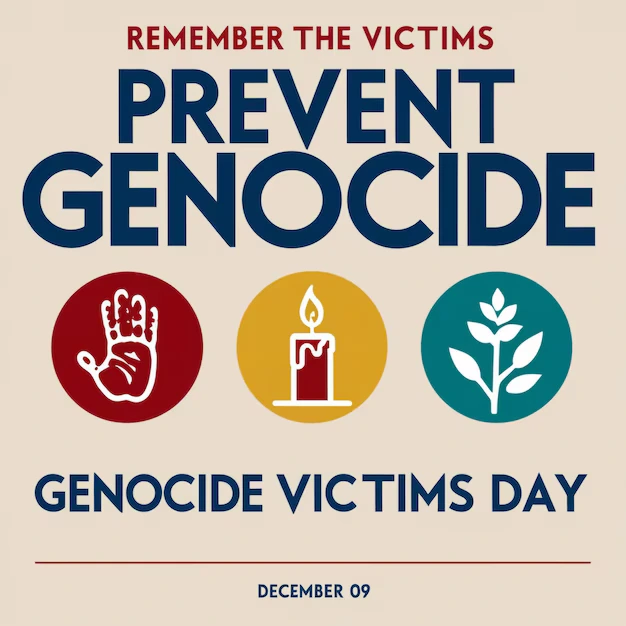International Day of Commemoration and Dignity of the Victims of the Crime of Genocide and the Prevention of This Crime- December 9th

The International Day of Commemoration and Dignity of the Victims of the Crime of Genocide and the Prevention of This Crime, observed every December 9th, serves as a global reminder of the horrors of genocide and the collective responsibility to prevent it. The day commemorates the victims of genocide while emphasizing the importance of addressing its root causes to ensure such atrocities never happen again. Established by the United Nations General Assembly in 2015, this day reinforces international efforts to promote human rights, tolerance, and justice.
The Historical Context of the Day
The date, December 9th, marks the adoption of the Convention on the Prevention and Punishment of the Crime of Genocide in 1948 by the United Nations General Assembly. This landmark treaty was the first human rights treaty adopted after World War II and was a direct response to the Holocaust and other genocidal acts. The convention defines genocide as acts committed with the intent to destroy, in whole or in part, a national, ethnic, racial, or religious group. It also obliges states to prevent and punish acts of genocide, making it a cornerstone of international human rights law.
The International Day of Commemoration was established to honor the victims of genocide, raise awareness about its consequences, and promote global action to prevent such crimes. By reflecting on past genocides—such as those in Rwanda, Bosnia, Cambodia, and during the Holocaust—the day underscores the importance of vigilance and proactive measures to combat hate and violence.
The Purpose and Significance of the Day
The International Day of Commemoration and Dignity has a dual purpose:
- Remembering the Victims
It is a solemn day to honor the memories of individuals and communities who have suffered the horrors of genocide. Remembering the victims keeps their stories alive and ensures that their suffering is not forgotten. - Promoting Prevention
This day highlights the necessity of preventing genocide through early intervention, education, and strengthening legal frameworks. It emphasizes the global community’s responsibility to identify warning signs of genocide and act decisively to stop it.
Commemorating the Day Worldwide
Countries, organizations, and individuals mark this day through various events and activities aimed at remembrance, education, and advocacy.
- Ceremonies and Memorials
Many countries and organizations hold memorial events to honor genocide victims. These ceremonies often include moments of silence, speeches, and reflections on the causes and consequences of genocide. - Educational Initiatives
Schools, universities, and NGOs organize discussions, workshops, and exhibitions to educate people about past genocides and the importance of preventing future atrocities. These programs aim to raise awareness about early warning signs and promote tolerance and inclusion. - Advocacy and Policy Discussions
The day serves as a platform for advocating stronger international and national policies to prevent genocide. Governments and organizations often discuss strategies to strengthen international cooperation, accountability, and legal mechanisms. - Cultural and Artistic Expressions
Art exhibitions, films, and literature often play a role in commemorating the day, offering powerful tools to convey the human impact of genocide and the importance of dignity and justice.
Preventing Genocide: A Shared Responsibility
The prevention of genocide requires collective action at all levels—local, national, and international. Early warning systems, education, and promoting human rights are crucial components of prevention efforts. Some key strategies include:
- Recognizing Early Warning Signs: Understanding the stages of genocide, such as discrimination, dehumanization, and polarization, can help detect risks early.
- Strengthening Legal Frameworks: Enforcing laws against hate speech, incitement to violence, and discrimination can reduce the likelihood of genocidal acts.
- Promoting Inclusive Societies: Encouraging dialogue, tolerance, and understanding among diverse communities fosters social cohesion and reduces divisions that can lead to violence.
- International Cooperation: Countries must work together to respond quickly to potential threats and hold perpetrators accountable through mechanisms like the International Criminal Court.
The Importance of Education and Awareness
Education plays a vital role in genocide prevention. By teaching the history and consequences of past genocides, societies can instill values of empathy, respect, and accountability in future generations. Awareness campaigns also help dispel prejudice and foster understanding, creating a culture where differences are celebrated rather than feared.
Reflecting on the Day’s Impact
The International Day of Commemoration and Dignity is not just a reminder of humanity’s darkest moments—it is a call to action. It urges individuals, governments, and organizations to confront hate, promote justice, and protect vulnerable communities. By learning from history and acting with compassion and vigilance, we can build a world where the crime of genocide is unthinkable.
The International Day of Commemoration and Dignity of the Victims of the Crime of Genocide and the Prevention of This Crime is a powerful reminder of the enduring importance of human rights and dignity. By honoring the victims and committing to prevention, this day inspires global action against hate and violence. As we reflect on the past, let us work together to ensure a future where the horrors of genocide are never repeated, and the values of justice, tolerance, and peace prevail.
